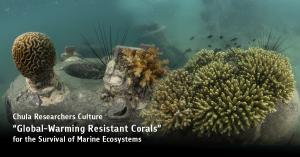Chula Researchers Culture 'Global-Warming Resistant Corals' for the Survival of Marine Ecosystems
BANGKOK, THAILAND, May 27, 2025 /EINPresswire.com/ -- Researchers at Chulalongkorn University’s Aquatic Resources Research Institute have developed innovative methods to help corals adapt to global warming. Through artificial insemination and raising corals in high-temperature environments from birth, they aim to cultivate corals capable of withstanding rising sea temperatures. In addition, they have introduced cryopreservation techniques to store coral sperm cells for future restoration.
Global warming, pollution, and human activities such as tourism and fishing have led to the widespread degradation of coral reefs. Scientists warn that if current trends continue, over 90% of global corals may become extinct within 30 years, threatening marine biodiversity and the global food chain.
Professor Dr. Suchana Chavanich, Marine Science Department, Faculty of Science, Chulalongkorn University, Deputy Director of the Aquatic Resources Research Institute, Chulalongkorn University, and Deputy Director of Chula Unisearch, and her team have been conducting coral breeding research since 2005. They found that corals raised in warmer water conditions (32-34 °C”) since birth adapt better to global warming. These corals, called “Corals Against Global Warming,” have shown promising survival and reproductive rates after being released into the sea.
Corals naturally reproduce sexually and asexually, but these methods are slow and increasingly unreliable due to climate change. The team developed artificial insemination techniques, collecting coral eggs and sperm during full-moon spawning events. The fertilized embryos are raised on terra cotta bricks in nurseries for two years and then reintroduced into the ocean to grow for another three years. These corals are ready to spawn at age five, significantly improving survival rates.
However, this method is costly, with each coral embryo costing around USD 100 compared to USD 1 for the coral fragmentation technique. Despite the cost, the high resilience to bleaching makes the investment worthwhile.
To further ensure the survival of coral species, the team collaborated with Taiwanese scientists to apply cryogenic technology. Coral sperm has been successfully frozen for future use, while egg freezing is still being developed. This approach could allow for coral revival when ocean conditions improve.
Prof. Dr. Suchana emphasizes that coral conservation must be a collective effort involving reef restoration, pollution reduction, public awareness, and sustained funding. With coordinated action, the revival and long-term survival of coral ecosystems is still possible.
Read the full article at https://www.chula.ac.th/en/highlight/236355/
Chula Communication Center
Chulalongkorn University
Pataraporn.r@chula.ac.th
Legal Disclaimer:
EIN Presswire provides this news content "as is" without warranty of any kind. We do not accept any responsibility or liability for the accuracy, content, images, videos, licenses, completeness, legality, or reliability of the information contained in this article. If you have any complaints or copyright issues related to this article, kindly contact the author above.
Realty Photos Expands Services as Hurricane Season and Natural Disasters Highlight Need for Insurance Documentation
Cygnus Compliance Unveils Bold Rebrand Ahead of Five-Year Milestone, Signaling the Next Era of Growth and Impact
Award-Winning Author Stephen Eoannou Releases Third Novel 'After Pearl' Featuring Private Investigator Nicholas Bishop
Więcej ważnych informacji
 Jedynka Newserii
Jedynka Newserii

 Jedynka Newserii
Jedynka Newserii

Farmacja

Nowy pakiet farmaceutyczny ma wyrównać szanse pacjentów w całej Unii. W Polsce na niektóre leki czeka się ponad dwa lata dłużej niż w Niemczech
Jeszcze pod przewodnictwem Polski Rada UE uzgodniła stanowisko w sprawie pakietu farmaceutycznego – największej reformy prawa lekowego od 20 lat. Ma on skrócić różnice w dostępie do terapii między krajami członkowskimi, które dziś sięgają nawet dwóch–trzech lat. W Unii Europejskiej wciąż brakuje terapii na ponad 6 tys. chorób rzadkich, a niedobory obejmują również leki ratujące życie. Nowe przepisy mają zapewnić szybszy dostęp do leków, wzmocnić konkurencyjność branży oraz zabezpieczyć dostawy.
Handel
Wzrost wydobycia ropy naftowej nie wpłynie na spadek cen surowca. Kierowcy jesienią zapłacą więcej za olej napędowy

Sierpień jest trzecim z rzędu miesiącem, gdy osiem krajów OPEC+ zwiększa podaż ropy naftowej na globalnym rynku; we wrześniu nastąpi kolejna zwyżka. Kraje OPEC, zwłaszcza Arabia Saudyjska, chcą w ten sposób odzyskać udziały w rynku utracone na skutek zmniejszenia wydobycia od 2022 roku, głównie na rzecz amerykańskich producentów. Nie należy się jednak spodziewać spadku cen ropy, gdyż popyt powinien być wysoki, a pod znakiem zapytania stoi dostępność ropy z Rosji. Nie zmienia to faktu, że jesienią ceny paliw na stacjach zazwyczaj rosną, a w największym stopniu podwyżki dotyczyć będą diesla.
Nauka
Szacowanie rzeczywistej liczby użytkowników miast dużym wyzwaniem. Statystycy wykorzystują dane z nowoczesnych źródeł

Różnica między liczbą rezydentów a rzeczywistą liczbą osób codziennie przebywających w Warszawie może sięgać nawet niemal pół miliona. Rozbieżności są dostrzegalne przede wszystkim w dużych miastach i ich obszarach funkcjonalnych. Precyzyjne dane populacyjne są tymczasem niezbędne w kształtowaniu usług społecznych i zdrowotnych, edukacyjnych, opiekuńczych, a także w planowaniu inwestycji infrastrukturalnych. W statystyce coraz częściej dane z oficjalnych źródeł, takich jak Zakład Ubezpieczeń Społecznych, są uzupełniane o te pochodzące od operatorów sieci komórkowych czy kart płatniczych.
Partner serwisu
Szkolenia

Akademia Newserii
Akademia Newserii to projekt, w ramach którego najlepsi polscy dziennikarze biznesowi, giełdowi oraz lifestylowi, a także szkoleniowcy z wieloletnim doświadczeniem dzielą się swoją wiedzą nt. pracy z mediami.









.gif)

 |
| |
| |
|